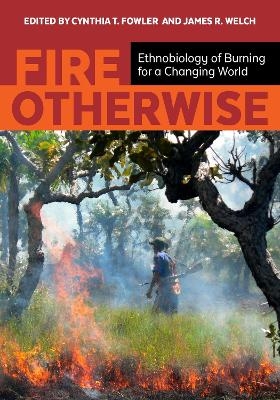
Fire Otherwise
Ethnobiology of Burning for a Changing World
Seiten
2018
University of Utah Press,U.S. (Verlag)
978-1-60781-614-0 (ISBN)
University of Utah Press,U.S. (Verlag)
978-1-60781-614-0 (ISBN)
Fire is a daunting human ecological challenge and a major subject in science and policy debates about global trends in land conversion, climate change, and human health. Fire Otherwise advocates for fire ecology research and management that embraces anthropogenic fire regimes and broader understandings of the ways humans interact with fire.
Fire is a daunting human ecological challenge and a major subject in science and policy debates about global trends in land conversion, climate change, and human health. Persistent environmental orthodoxies reduce complex burning traditions to overly simplistic representations of environmental destruction, degradation, and loss while reinforcing existing social inequities involving smallholders. Fire Otherwise: Ethnobiology of Burning for a Changing World advocates for a more inclusive and pluralistic fire ecology, a shift from the paradigmatic globalized version of fire science and management towards research and management that embraces anthropogenic fire regimes and broader understandings of the ways humans interact with fire. The authors present new evaluations of human interactions with fires in contexts of changing environmental conditions. Through deep description and analysis of knowledge and practices enacted by local communities who ignite, manage, and extinguish fires, this collection of case studies supports proactive local and regional efforts to adapt amidst continually changing social and ecological circumstances.
Fire is a daunting human ecological challenge and a major subject in science and policy debates about global trends in land conversion, climate change, and human health. Persistent environmental orthodoxies reduce complex burning traditions to overly simplistic representations of environmental destruction, degradation, and loss while reinforcing existing social inequities involving smallholders. Fire Otherwise: Ethnobiology of Burning for a Changing World advocates for a more inclusive and pluralistic fire ecology, a shift from the paradigmatic globalized version of fire science and management towards research and management that embraces anthropogenic fire regimes and broader understandings of the ways humans interact with fire. The authors present new evaluations of human interactions with fires in contexts of changing environmental conditions. Through deep description and analysis of knowledge and practices enacted by local communities who ignite, manage, and extinguish fires, this collection of case studies supports proactive local and regional efforts to adapt amidst continually changing social and ecological circumstances.
Cynthia T. Fowler is an anthropologist, ethnobiologist, and fire ecologist who teaches at Wofford College in South Carolina. She currently serves as president of the Society of Ethnobiology. James R. Welch is an anthropologist and researcher at the National School of Public Health in Rio de Janeiro and a research fellow with the National Council for Scientific and Technological Development in Brazil.
| Erscheinungsdatum | 01.09.2018 |
|---|---|
| Zusatzinfo | 31 illustrations, 7 maps |
| Verlagsort | Salt Lake City |
| Sprache | englisch |
| Maße | 178 x 254 mm |
| Gewicht | 550 g |
| Themenwelt | Naturwissenschaften ► Biologie ► Ökologie / Naturschutz |
| Sozialwissenschaften ► Ethnologie | |
| Sozialwissenschaften ► Soziologie | |
| Technik ► Bauwesen | |
| ISBN-10 | 1-60781-614-8 / 1607816148 |
| ISBN-13 | 978-1-60781-614-0 / 9781607816140 |
| Zustand | Neuware |
| Haben Sie eine Frage zum Produkt? |
Mehr entdecken
aus dem Bereich
aus dem Bereich
Lehrbuch zu Grundlagen, Technologie und Praxis
Buch | Hardcover (2022)
Hanser (Verlag)
34,99 €


